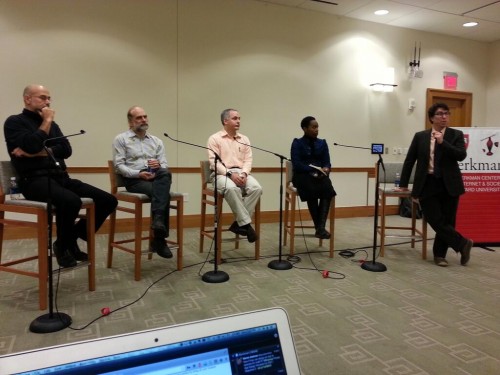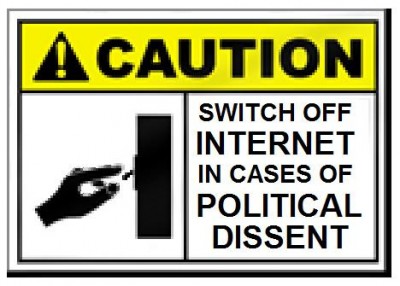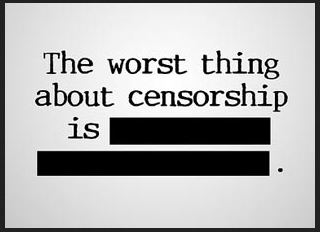
If you follow me on Twitter, you almost certainly know of my propensity to livetweet the talks I attend (which is either the best or the worst thing about following me on Twitter, depending on your interests and whether or not you know how to use hashtag muting). In the spirit of Cyborgology‘s new #review feature, which looks at conversations surrounding academic articles, I thought I’d try summarizing my tweets from the talk I attended last night: “Defending an Unowned Internet” at the Berkman Center for Internet and Society at Harvard University.
“Defending an Unowned Internet” was a spirited conversation between Yochai Benkler, Ebele Okobi, Bruce Schneier, and Benjamin Wittes, plus moderator Johnathan Zittrain (you can find links to bios for all five participants here). Zittrain opened the panel by suggesting that what, exactly, an “unowned Internet” is was up for debate, and also used Wittes’s blog Lawfare in a cautionary tale: Someone(s) out there really, really doesn’t like Lawfare, which has experienced several outages in recent months as a result of “cyberattacks.” Lawfare‘s hosting service has done everything it can to keep Lawfare up and running, but beyond determining that the attacks are coming from IP addresses in the Netherlands, there isn’t much to be done.
Zittrain, therefore, posed the following question: What if this type of attack on speech meant that, in the future, everyone would move their web content to one of four major web hosting services—say, behemoths like Amazon Web Services—which are harder to overwhelm with DoS or DDoS attacks? Moving most of the Web’s content to the tiny number of service providers with that level of infrastructure might grant better protection from DDoS attacks (and thereby protect free speech), but doing so would in turn grant that tiny number of service providers a good deal of power for censorship and surveillance of their users (and thereby endanger free speech). Now what?
The subsequent debate focused primarily on what should be the state’s relationship to the Web, and less on issues of corporate control. With “net neutrality” fresh on my mind, I’d been hoping to hear more about the latter; I’m more than a bit anxious about defending the Web against large ISPs, and to be honest, I’m personally more wary of Google than I am of state law enforcement apparatuses. [1) I’m just going to sidestep the NSA here for a moment; 2) Privilege check: #race, #class.] All that said, wow: There’s some thorny issues wrapped up in the “state” side of these things that I’d never thought to consider, and that I’m now trying to process out.
“Defending an Unowned Internet” covered a lot of ground in an hour and a half, so I’m going to provide a general summary of what I felt were each panelist’s main points rather than attempt to capture everything; note that I’m following themes here, rather than writing in chronological order (Berkman will post video of the panel here within the next few days). I particularly welcome comments from others who attended the panel, or from the panelists themselves—and I apologize in advance if there’s anything I’ve not captured quite right!
For Benkler, the main issue in play was one of control: Allowing any entity to “own” the Internet gives that entity a measure of influence over the Web that can all too easily be exploited, whether by that entity directly or by the state through that entity. The question we should ask is not whether or not there should be rules, but rather how to balance the degrees of power granted to various actors. Of course, some powers are more worrisome than others: Corporate surveillance might be bad, but to Benkler, state surveillance deserves more of our scrutiny and attention (not least because the state has the ability both to conduct its own surveillance and to demand data collected by corporations).
The most concerning thing about major web service providers is not that they are surveilling us, Benkler said, but that they are reproducing older, less creative modes of media engagement. Netflix, for instance, may be taking the place of broadcast television, but it isn’t really a new way to watch TV; rather, Netflix reinstates an older model of passive media consumption. Corporations might be stifling our creativity, and thereby reducing our inclination to speak, but state surveillance threatens our very ability to speak. Balancing the state’s power over the Web should therefore be our first concern.
Okobi argued in favor of letting the state control policing of the Internet, and in favor of corporations falling in line behind the state—which is something I hadn’t expected from the panel’s only tech company representative. Elected officials, Okobi explained, are at least elected; there is some measure of state accountability to the public. Tech company decision makers, on the other hand, are at best accountable to their shareholders and at worst accountable to no one. Do we really want tech companies deciding for themselves what is good, or right, or just? We get upset when our web service providers comply with NSA requests for information, but according to Okobi, we’re not thinking that through: If corporations don’t respect the authority of the state, then what will keep them in check? Wanting corporations to defy the NSA is asking them to obey the law some of the time, but not all of the time—something Okobi finds “inconsistent.”
Similarly, we might think that we want an unregulated, unpoliced Internet, or that we want email that is encrypted and 100% subpoena-proof, but really we don’t. We want—or at least, we should want—strong enforcement on the Web, and for that enforcement to come from the state. “Community enforcement” might be a nice idea in theory, but in practice it doesn’t work—at least, not in favor of justice. Community enforcement is how we get vigilantism, or how groups that are already more powerful retain the ability to silence others. “Women get voices on the Internet, but what happens to them afterward?” Okobi asked, referencing the vast quantity of rape threats, death threats, and other harassment that women authors collectively receive via the Web on a daily basis. (On a less intense note, I thought of David Banks‘s post about how sites with up- and down-voting end up further silencing marginalized voices.) Similarly, Okobi assured the room that “child pornography is A Thing,” and that yes, we do want the state to prevent its circulation. Though not in favor of recent abuses by the NSA, Okobi stated that the agency’s actions were actually something of a gift in that they had forced the world to recognize that Web-based state surveillance happens “in the ‘good’ countries, too.'” The answer to “bad policing,” however, should be better policing; it should not be “no policing.”
Wittes took this line of reasoning further, and argued that the problem with the modern Web was not too much authority and enforcement, but too little. At first, “as a young, civil libertarian journalist,” he’d seen the FISA court as COINTELPRO all over again. Over time, however, Wittes became “sympathetic” to the rationale behind FISA. He’d spent time in the middle of civil wars, in areas where there was no rule of law—and, based on those experiences, decided that the Rule of Law was actually a pretty good thing. Wittes went so far as to reference Hobbes’s Leviathan, the premise of which is basically two-fold: 1) human nature is pretty nasty, and so in order to coexist as a society, 2) we each give up some of our rights and authority to a sovereign, who/which in turn receives a monopoly on violence and uses that power to save us from ourselves.
By extension then, what Wittes was arguing is that, if left in its unregulated state (or “state of nature”), the Internet would be a pretty nasty place used for all sorts of terrible ends. If we are all to coexist on the Internet, and if the Internet is to be used for positive ends, then we must all give up some of our rights and authority to the state, which will in turn keep these criminal- and undesirable uses of the Internet in check. The idea of granting the state more power over the Web seemed to make a good portion of the room uncomfortable, but Wittes gave an example: How did he know that, right now, the local police department was not battering down his front door and raiding his house? I braced for a “nothing to hide / nothing to fear” argument, but thankfully, that’s not where Wittes took it. He knew the police were not breaking down his front door because “rules forbid it,” and on the off-chance the police were to break down his door unjustly, he knew he had channels of recourse. Wittes’s faith in the justice (“justice”) system screamed of unchecked privilege to me—is there anyone out there who’s not a straight, middle-class white man who genuinely believes the police exist to “serve and protect” him or her?—but there is a valid point in there: If you don’t like the state’s policies, or if the state violates its policies, you can at least in theory do something about it. If you don’t like, say, Google’s policies, or if Google violates its policies, your options are mostly limited to…well…don’t use Google products (which, these days, is easier said than done). What should concern us is not the Internet as a “zone of enforcement,” but the Internet as a “zone of impunity.”
So which is more dangerous, then: a state-of-nature Internet, or a state-controlled Internet? If Wittes was solidly on Team Hobbes, then Schneier was flying colors for Team Rousseau (if without name-checking the philosopher directly). Hobbes would see a greater danger in the state-of-nature Internet, which Wittes likened to a foreign war zone. Rousseau, on the other hand, would see a far lesser danger in the “primitive” Internet, which Schneier argued was really not so bad. The state has only figured out how to police the Internet comparatively recently, Schneier said; up until that point, “We had the unpoliced Internet…and we came out pretty okay.” It’s not that we need the state to protect us from each other on the Web, but that we need the Web to protect ourselves and each other from the state. Similarly, while Wittes and Okobi were more concerned with the crimes that would take place via the Web without strong state enforcement, Schneier was concerned with the crimes that wouldn’t occur if the state had more control over the Web, such as activism and dissident speech. “Being able to break the law is how we improve society,” Schneier said; “That’s how we got gay marriage, for instance,” or the Civil Rights Movement (to name just a few such improvements). “The price of liberty is the possibility of crime.”
Schneier further argued for the value of “the unowned commons,” and for preserving the Internet as such—because ownership grants control. “There are protests you can have outside Harvard Yard that you cannot have inside Harvard Yard,” Schneier pointed out. Although foot traffic can move freely between Harvard Yard and the sidewalk beyond it, these two places are not the same thing; different rules apply in each. The same holds true for the Web: Facebook, for instance, is like Harvard Yard, even though the lack of a giant iron fence around the site makes the distinction between it and the open Web a bit less obvious. A world in which we all thought we were standing on the sidewalk, but were in fact locked inside Harvard Yard, could have dire consequences.
As Zittrain observed, the specter of “conformity” looms large on both sides of this conceptual spectrum. Give the state too much power over the Internet, and it will use that power to squelch its opposition; activists will be targeted, and dissidents silenced. Give corporations too much power over the Internet, on the other hand, and it’s not terribly different from giving too much power to the state (the downside is even less recourse for the public; the upside is that Google doesn’t command an army…yet). Give power over the Internet to no one, however, and existing power structures continue to reproduce themselves: women get death threats, children get exploited, and marginalized Others get further marginalized. Now what?
In the absence of utopia, all imaginable solutions seem untenable. DDoS attacks against blogs, threats against women, and marginalization of Othered authors remind us that, in the words of my friend Daed, “greatest individual liberty and smallest ruleset are totally orthogonal to one another.” Put simply: If we agree that free speech should be protected, we must also acknowledge that free speech cannot exist in a vacuum. Until such time as Utopia has arrived and all social injustice has been ironed out, self-policing will not be an effective way to promote justice on the Web writ large. Accordingly, preserving “free speech” must mean building systems and structures that shield our ability to speak not just from the state, but also from each other.
Seriously though: How do we do that? No one on the panel suggested leaving that matter to corporations; in fact, Schneier warned against it, and Okobi indicated that corporations frankly don’t want the responsibility of having to decide what is “the right thing to do.” That leaves us with the state, which…oh man. Wittes was all for it; Okobi admitted the current version of state enforcement isn’t great, but still felt the state was the best actor to do it; Benkler was concerned about state control, and moreso than he was about corporate control; Schneier all but argued that the state is the worst possible option. Compared to “corporations” and “individuals,” I thought “the state” sounded like the least of all evils—but only until I stopped thinking about some vague concept of “the state” and considered instead the track record of the U.S. government during my lifetime, at which point I was right back where I started.
For Wittes, the enforcement question boiled down to two key questions: 1) “What is the substance of the rules?”; 2) “What are compliance systems, and do you have faith in them?” Wittes—who, recall, had some pretty strong faith in the compliance systems surrounding law enforcement in the U.S.—looked at these questions and was happy leaving control of the Web to the state. As one hashtag participant noted, however, “technologists have WAY more faith in the processes of warrants than us lawyers”; another hashtag participant responded that this is because technologists have less faith in technology than do lawyers. Still another hashtag participant answered Wittes’s questions by saying, “I have very little faith in the compliance systems and I’m not sure about the rules in the first place.” Perhaps I’m too much the cynical sociologist, but for real: If keeping power accountable has become a matter of faith, we are all in some serious trouble.
My conclusion, then, is that the best agency to regulate the Web in accordance with social justice is some agency as-yet unimagined, some option not currently on the table. Corporations won’t design that, and neither will the state; after all, power hates to relinquish power. Looks like the ball is back in individual users’ court after all.
Whitney Erin Boesel (@weboesel) lives in Cambridge, MA, and livetweets from all over the place.



Comments 3
ArtSmart Consult — February 6, 2014
Individuals need to vote for a state that has swarm intelligence.
else 2.10: "Information that was never designed for a human to see" | John Battelle's Search Blog — February 10, 2014
[…] #recap: Defending an Unowned Internet — Cyborgology Whitney Erin Boesel posted a nice recap of this Berkman talk discussing the consolidation of most of the web into corporate ownership (ex AWS). Video from the conversation is here in full. […]
Nick Judd — February 17, 2014
Hi Whitney,
Thanks so much for this detailed summary and for your provocation at the end. "The unowned commons" is a particularly nice turn of phrase — thanks especially for passing it along.
I wonder if we could hear more about "the web we lost," to borrow the technologist Anil Dash's phrase. (http://dashes.com/anil/2012/12/the-web-we-lost.html) I'd be particularly interested to know if people like Yochai Benkler and Bruce Schneier think of that web purely in the past tense — the DIY, peer-to-peer, unowned-commons web. There's a very strong case to be made that this Internet is one we had but has been wholly left behind and no amount of yearning for its return will build something like it, ever again. This argument might hold that state, and by direct extension, corporate control of the Internet will continue to increase. You might also look at, for example, the mechanisms Twitter has come up with to deal with its obligations for selective censorship in different parts of the world, and argue that a Balkanized Internet is also inevitable.
Put another way, your question — "How do we do that?" — might be rendered moot; maybe there is no "we;" maybe there is only "they," the states and the corporations, who are already running the show completely, or will very soon.
I wonder if the Benklers and the Schneiers of the world, who advocate for decentralized control, individual freedom, and peer-to-peer action, see any cause for optimism, any real momentum in the direction they like, and if so, where ...